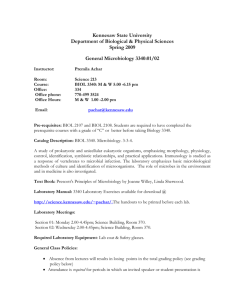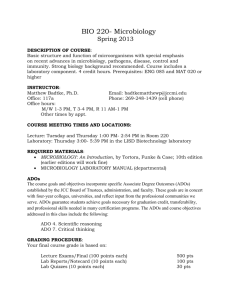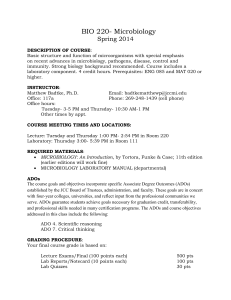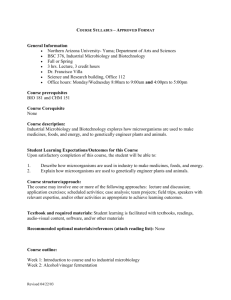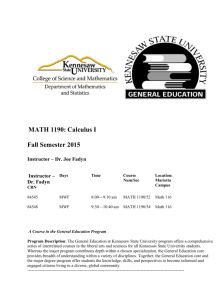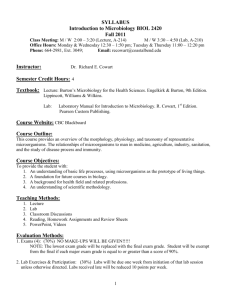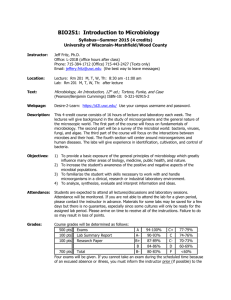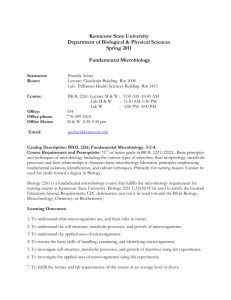No cell phones - Faculty Web Pages
advertisement
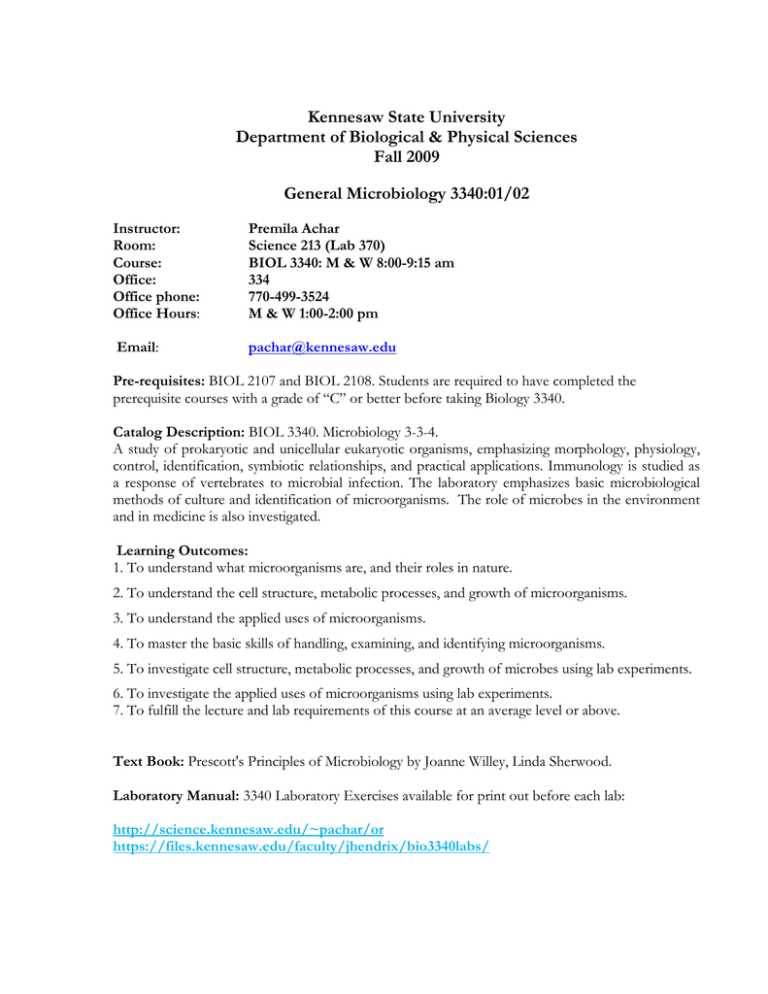
General Microbiology: 3340: 03/04 Fall 2008 Kennesaw State University Department of Biological & Physical Sciences Fall 2009 General Microbiology 3340:01/02 Instructor: Room: Course: Office: Office phone: Office Hours: Premila Achar Science 213 (Lab 370) BIOL 3340: M & W 8:00-9:15 am 334 770-499-3524 M & W 1:00-2:00 pm Email: pachar@kennesaw.edu Pre-requisites: BIOL 2107 and BIOL 2108. Students are required to have completed the prerequisite courses with a grade of “C” or better before taking Biology 3340. Catalog Description: BIOL 3340. Microbiology 3-3-4. A study of prokaryotic and unicellular eukaryotic organisms, emphasizing morphology, physiology, control, identification, symbiotic relationships, and practical applications. Immunology is studied as a response of vertebrates to microbial infection. The laboratory emphasizes basic microbiological methods of culture and identification of microorganisms. The role of microbes in the environment and in medicine is also investigated. Learning Outcomes: 1. To understand what microorganisms are, and their roles in nature. 2. To understand the cell structure, metabolic processes, and growth of microorganisms. 3. To understand the applied uses of microorganisms. 4. To master the basic skills of handling, examining, and identifying microorganisms. 5. To investigate cell structure, metabolic processes, and growth of microbes using lab experiments. 6. To investigate the applied uses of microorganisms using lab experiments. 7. To fulfill the lecture and lab requirements of this course at an average level or above. Text Book: Prescott's Principles of Microbiology by Joanne Willey, Linda Sherwood. Laboratory Manual: 3340 Laboratory Exercises available for print out before each lab: http://science.kennesaw.edu/~pachar/or https://files.kennesaw.edu/faculty/jhendrix/bio3340labs/ Laboratory Meetings: Section 01: Monday 9:30-12:15am; Science Building, Room 370. Section 02: Wednesday 9:30-12:15am; Science Building, Room 370. Required Laboratory Equipment: Lab coat & Safety glasses. General Class Policies: Attendance is required for periods in which an invited speaker or student presentation is scheduled. If you miss a lecture, YOU are responsible for obtaining all notes, announcements, and assignments. Lecture notes will be available via my Home page: http://science.kennesaw.edu/~pachar/ The lecture schedule provided is TENTATIVE and subject to changes. Students will be notified of schedule changes as soon as possible in class or will be posted on the instructor’s web site under “notices”. Cellular telephones, pagers and other similar devices must be turned off during class. No snacking is allowed in the class room once lecture begins. If you miss class, it is your responsibility to get any missed notes and handout from another student. Instructor’s Power point lectures/quiz/exam samples will be posted on instructor’s web page. General Laboratory Policies: Procedure for each experiment will be available via my Home page: http://science.kennesaw.edu/~pachar/.Print each lab exercise prior to lab and maintain in a file. You must prepare for laboratory each week by reading the scheduled exercises in the laboratory manual. Before leaving the laboratory, each student must have the instructor or laboratory assistant to inspect the condition of his or her work area, microscope, and other equipment. Failure to clean the work area and equipment or to return equipment to its proper place will result in a 1 point reduction in the lab report grade per offense. Attendance Policy: You must attend the laboratory section in which you are registered. Attendance of leach lab session is essential for success in this class. Roll will be taken and this will factor into the final course grade. Each absence will result in a loss of 5 points**in the total grading policy (see grading policy below). Attendance is required for periods in which an invited speaker or student presentation is scheduled. If you miss 3 lab sessions, YOU will be considered FAIL. Students will be notified of schedule changes as soon as possible in class. Lab Safety regulations: Students are required to obey all safety regulations during laboratory, as published in the laboratory manual. In particular: No food or drink is allowed in the lab as per department and university regulations.This includes unopened food packages and beverage containers. Students are required to wear safety glasses. Students are encouraged to purchase their own safety glasses. Shorts and short skirts are prohibited. Open-toed shoes, open-heeled shoes, sandals, and bare feet are prohibited. All waste must be disposed in properly labeled containers as directed by the instructor or lab assistant. Cellular telephones, pagers and other similar devices must be turned off during lab session. Failure to obey safety regulations will result in a 10 points penalty per offense*** Assignment and Quizzes and Exams Cellular telephones, pagers and other similar devices must be turned off and kept in bags at all times during quizzes and exams. Evaluation will take the form of Assignments, Quizzes and Group activities Lab reports may not be placed in the box on the instructor’s door. Lab reports may not be submitted electronically, except in extreme circumstances and with the prior approval of the instructor. Several weeks identified on the schedule, the laboratory will begin with a laboratory quiz. The quiz will contain questions about the new lab exercise that you are starting and the lab from the week before. Lab quizzes graded (see course grading table). There are three “laboratory report grades”, One of the “lab report” grade is a practical consisting of a successful streak plate. The other two are the laboratory worksheets for Units 3 and 5. The lab worksheets are due the week after the lab is completed. The last laboratory exercise is a “mixed unknown” which is also graded. All laboratory work must be completed and turned in on time. All quizzes, assignments and other course materials are related to lab work not collected by students will be shredded and recycled at the conclusion of the final exam period MAKING UP FOR MISSED LAB SESSIONS, QUIZZES, AND ASSIGNMENTS Lab sessions will not be repeated for a particular group. Make-up quiz/exam/assignments will only be granted in extreme circumstances, and at the instructor’s discretion. Examples of acceptable excuses include: serious illness, funeral and others. The determination of the validity of other excuses and the necessary documentation to support them will be at the instructor’s discretion. There is no make up for Final exam. Inclement Weather: In adverse weather situations, find out the status of school closings by checking the following weblink:https://portal2.kennesaw.edu/pls/portal92/APP_SNOW.DYN_SHOW_STATUS.show COURSE GRADING PROCEDURE: Final letter grades A, B, C…in the course will be assigned according to the point breakdown listed below: Totals Graded assignments 4 Exams @ 100 pts. Each* 2 Class Activities @ 10 pts. each 6 Pre-LabQuizzes @ 10 pts. each Lab Reports (3) @ 3x10 Lab Unknown Report Grand Total 400 pts. 20 pts. 60 pts. 30 pts. 100 pts. 610 Final course grades Percentage (%) A B C D. F 90-100 80-89 70-79 60-69 <60 o *Exams will include questions from lectures labs o **Failure to attend each lab will result in 5 points (see attendance policy for lab) & absence for 3 labs is considered Fail in the course. o ***Failure to obey safety regulations will result in a 10 points penalty per offense ( see lab safety regulations). Tentative Course Outline (subject to change upon the discretion of the instructor). Dates Text Chapter Topic Aug 17 - Introduction and Overview Aug 19 Chapter 1 History and Scope of Microbiology Aug 24 & 26 Chapter 3 Prokaryotic Cell Structure Aug 31 & Sep 2 Chapter 4 Eukaryotic Cell Structure Sept 7 No Class Labor Day Sep 9 & 14 Chapter 5 Viruses and Other Cellular Agents Sep 16 - Exam 1 Sep 21 & 23 Chapter 6 Microbial Nutrition Sep 28 & 30 Chapter 7 Microbial Growth Oct 5 & 7 Chapter 8 Microbial Control Oct 12 & 14 Chapter 9 Introduction to Metabolism Oct 19 & 21 Chapter 10 Catabolism Oct 26 Chapter 12 Gene: Structure, replication and Expression Nov 2 Chapter 12 Nov 4 & 9 Chapter 17 Exam 2 Gene: Structure, Replication & Expression (Cont.) Microbial Taxonomy Nov 11 & 16 Chapter 30 Pathogenicity of Microorganisms Nov 18 - Nov 23 Chapter 32 Nov 25 No Class Exam 3 Clinical Microbiology, Immunology & Survey of selected Human pathogens Fall Break Nov 30 Chapter 33 Epidemiology and Infectious Disease Dec 2 Last Day of Class Review of Final Exam Dec 4-10 Cumulative Final Exams Oct 28 3340 Laboratory Schedule – Fall 2009 M & W- 9:30am-12:15pm; SC 370 Link to print out each lab: https://files.kennesaw.edu/faculty/jhendrix/bio3340labs/ Week of Lab Exercises Pre lab Quiz 17&19-Aug No Lab 24&26-Aug Laboratory Safety Training Begin Unit 1. Aseptic technique None 31-Aug & 2-Sep Finish Unit 1. Begin Unit 2 Microscopy Microscopy 7&9-Sep No lab (Monday Holiday) 14&16-Sep Finish Unit 2. None None 21&23-Sep Begin Unit 3. Biochemical Characterization 28&30-Sep Finish Unit 3. Unit 4 deleted. None 5&7-Oct Begin and Finish Unit 5. Quantitative Microbiology-Bacterial growth Quantitative Microbiology 12&14-Oct Begin Unit 6. Control of Microbial Growth Microbial Growth 19&21-Oct Finish Unit 6. Begin Unit 7. Microbial Ecology-Soil & water Microbiology Continue Unit 7. Begin Unit 8 Food Microbiology Microbial Ecology 26&28-Oct 2&4-Nov 9&11-Nov Finish Unit 7. Finish Unit 8. Begin Unknowns. Continue Unknowns - Gram Staining and Begin Biochemical Tests 16&18-Nov Finish Unknowns Last Lab 23-Nov Unknown report due (submit in lecture class mon.) Biochem. Character. Food Microbiology None None None Academic Integrity Every KSU student is responsible for upholding the provisions of the Student Code of Conduct, as published in the Undergraduate and Graduate Catalogs. Section II of the Student Code of Conduct addresses the University's policy on academic honesty, including provisions regarding plagiarism and cheating, unauthorized access to University materials, misrepresentation/falsification of University records or academic work, malicious removal, retention, or destruction of library materials, malicious/intentional misuse of computer facilities and/or services, and misuse of student identification cards. Incidents of alleged academic misconduct will be handled through the established procedures of the University Judiciary Program, which includes either an "informal" resolution by a faculty member, resulting in a grade adjustment, or a formal hearing procedure, which may subject a student to the Code of Conduct's minimum one semester suspension requirement. Plagiarism and Cheating The above is in accordance to the University policy concerning plagiarism and cheating as stated in the KSU Student Code of Conduct. Refer to KSU document. All instances of academic misconduct, both intentional and unintentional, will be handled through established procedures of the University Judiciary Program (http://www.kennesaw.edu/judiciary/procedur.shtml). Students violating the University's academic honesty code are subject to University-level disciplinary action, which may include suspension or expulsion from the University. For exams, any student observed cheating will receive an automatic zero for the entire exam in addition to any penalties assessed through campus disciplinary procedures. Academic Withdrawal Policy Students may withdraw from one or more courses anytime before the last three weeks of the semester. However, as of Fall 2004, students will be allowed a maximum of eight total withdrawals if they enter KSU as a freshman. Transfer students will be allowed one withdrawal per fifteen credit hours attempted, for a maximum of eight. Students who choose to pursue a second degree at KSU will be allowed two additional withdrawals. Students who entered KSU before the Fall of 2004 will be allowed one withdrawal per fifteen credit hours attempted for a maximum of eight. To withdraw, the student should complete an official withdrawal form in the Office of the Registrar. Students who officially withdraw from courses on or before the last day to withdraw without academic penalty will receive a “W”. Students who officially withdraw after the last day to withdraw without academic penalty (and before the last three weeks of the semester) will receive a “WF”, which will be counted as an “F” in calculation of their grade point average. The only exceptions to these withdrawal regulations will be for instances involving unusual circumstances, which are fully documented. Students may appeal to the academic standing committee for consideration of unusual circumstances. Students cannot withdraw from their courses and remain in the program; they must carry at least 3 hours of credit. Program staff will not handle course withdrawals. Students must contact their home institutions (where they are registered) and handle the process themselves. They must provide the Faculty Member and Program Director with evidence that they have dropped the course. Academic accommodations Any student with a documented disability or medical condition needing academic accommodations of class-related activities or schedules must contact the instructor immediately. Written verification from the KSU disAbled Student Support Services is required. No requirements exist that accommodations be made prior to completion of this approved University documentation. All discussions will remain confidential."
